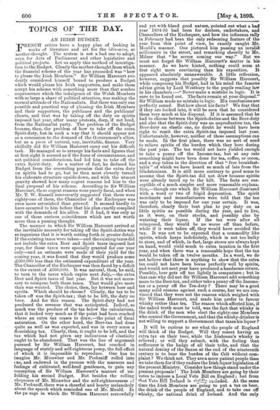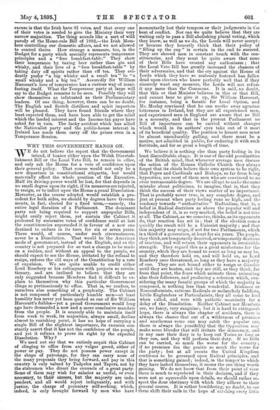TOPICS OF THE DAY.
AN IRISH BUDGET. FRENCH critics have a happy plan of looking in works of literature and art for the idee-mere, or mother-thought. The system is not a bad one to adopt, even for Acts of Parliament and other legislative and political projects. Let us apply this method of investiga- tion to the Budget. Clearly the mother-thought from which the financial scheme of the year has proceeded was "how to please the Irish Members." Sir William Harcourt evi- dently considered himself bound to produce a Budget which would please his Irish supporters, and make them accept his scheme with something more than that sombre , acquiescence which the indulgence of the Welsh Members with so large a share of political attention, was making the normal attitude of the Nationalists. But there was only one possible and practical way of pleasing the Irish Members and their supporters, the publicans and the publicans' clients, and that was by taking off the duty on spirits imposed last year, after many protests, deep, if not loud, from the Nationalist party. The problem of the Budget became, then, the problem of how to take off the extra Spirit-duty, but in such a way that it should appear not as a concession to the demand of the Government's allies, but as a piece of natural, nay, inevitable, finance. Very skilfully did Sir William Harcourt carry out his difficult task. He managed so to arrange his facts and figures that at first sight it seemed as if the force of circumstances, and not political considerations, had led him to take off the extra Spirit-duty. As a matter of fact, he deduced his Budget from the overruling premiss that the extra duty on spirits had to go, but he then most cleverly turned his elaborate structure upside-down, and with the utmost gravity showed how many cogent reasons led him to the final proposal of his scheme. According to Sir William Harcourt, these cogent reasons were purely fiscal, and when Mr. T. W. Russell irreverently suggested that there were eighty-one of them, the Chancellor of the Exchequer was even more astonished than grieved. It seemed hardly to have occurred to him before that his plan exactly complied with the demands of his allies. If it had, it was only as one of those curious coincidences which are not worth more than a passing thought.
The manner in which Sir William Harcourt arrived at the inevitable necessity for taking off the Spirit-duties was so ingenious that it is worth setting forth in greater detail. If the existing taxes were taken—and the existing taxes did not include the extra Beer and Spirit taxes imposed last year, for those taxes were specially granted for one year only—and an estimate were made of their yield for the coming year, it was found that they would produce some £300,000 less than the estimated expenditure of the year. The Chancellor of the Exchequer was then faced by a deficit to the extent of £300,000. It was natural, then, he said, to turn to the taxes which expire next July,—the extra Beer and Spirit taxes of last year. But it was not neces- sary to reimpose both these taxes. That would give more than was wanted. The choice, then, lay between beer and. spirits. Which should he choose ? Clearly, the tax to be taken off was the Spirit-tax ; that to be left, the duty on beer. And for this reason. The Spirit-duty had not produced the revenue that was anticipated. Indeed, so much was the produce of the tax below the calculations, that it looked very much as if the point had been reached where an extra tax ceases to draw,—the point of fiscal saturation. On the other hand, the Beer-tax had done quite as well as was expected, and was in every sense a flourishing tax. Clearly, then, it ought to be left, and the tax which had not given any indications of elasticity ought to be abandoned. That was the line of argument pursued by Sir William Harcourt, but couched in language of stately and self-righteous pomp, the full effect of which it is impossible to reproduce. One has to imagine Mr. Micawber and Mr. Pecksniff rolled into cne, and endowed in the process with the manners and. feelings of cultivated, well-bred gentlemen, to gain any conception of Sir William Harcourt's manner of un- folding his second Budget. But besides the rolling eloquence of Mr. Micawber and the self-righteousness cf Mr. Peck-sniff, there was a cheerful and hearty melancholy about the speech which reminded one of Mr. Mould. In the pa-sage in which Sir William Harcourt sorrowfully and yet with bland good nature, pointed out what a had year 1894-95 had been for doctors, undertakers, and Chancellors of the Exchequer, and how the influenza rally in February had been the only redeeming feature of the year from this point of view, he exactly caught Mr. Mould's manner. One pictured him passing an invalid millionaire in the street, and remarking cheerily to Mr. Milner that "he seems coming our way." But we- must not forget Sir William Harcourt's matter in his. manner. As we have hinted, nothing could seem at first sight more convincing than his exposition. It appeared absolutely unanswerable. A little reflection,. however, suggests that possibly Sir William Harcourt, while composing his Budget, had in his mind the famous advice given by Lord Westbury to the pupils reading law in his chambers :—" Never make a mistake in logic. It is sure to be found out. The facts remain at your disposal.' Sir William made no mistake in logic. His conclusions are perfectly sound. But how about his facts ? We fear that if they are looked into, it will be seen that he considered them very much at his disposal. If it is assumed that he had to choose between the Spirit-duties and the Beer-duty and also that the Spirit-duty was an unproductive tax, the Beer-duty an elastic one, no doubt he would have been right to remit the extra Spirit-tax imposed last year. Unfortunately, however, neither of these assumptions can be made. In the first place, there was no sort of need to relieve spirits of the burden which they bore during the past year. The tax would not have yielded enough to take a penny off the Income-tax, but at any rate something might have been done for tea, coffee, or cocoa,, and a step taken in the direction of that "free breakfast- table" of which we have heard so much of late from the Gladstonians. It is still more contrary to good sense to assume that the Spirit-tax did not draw because spirits were already taxed up to the hilt. The facts are sus- ceptible of a much simpler and more reasonable explana- tion,—though one which Sir William Harcourt dismissed with a word or two of frigid deprecation. The spirit merchants and manufacturers were told that the tax was only to be imposed for one year certain. It was, therefore, clearly their best plan to pay duty on as little spirits as possible during the year, and to lives, as it were, on their stocks, and possibly also by watering their liquor. If the tax were after all reimposed, they would be no worse off than before, while if it were taken off, they would have avoided the tax. It was not to be expected that a commodity like spirits, which keeps indefinitely, which is not too bulky to store, and of which, in fact, large stores are always kept on hand, would yield much to extra taxation in the first year, and when there was a reasonable hope that the tam would be taken off in twelve months. In a word, we do. not believe that there is anything to show that the extra tax could not have been borne perfectly well by spirits, and would not next year have produced a handsome return. Possibly, beer gets off too lightly in comparison ; but in that case why did not Sir William Harcourt add something more to the Beer-tax, and either take a penny off the Income- tax or a penny off the Tea-duty ? There may be a good many solid reasons against such a course, but we are con- vinced that they were not the reasons which weighed with Sir William Harcourt, and made him prefer to favour whisky rather than tea. The reason which affected him, if the naked truth must be told, was the fact that whisky is the drink of the men who elect the eighty-one Members who control the Government, and that the whisky-drinker is not willing to support a Government that taxes his liquor ?
It will be curious to see what the people of England will think of the Budget. Will they resent having an extra tax on their beer, while the Irishman's whisky is relieved ; or will they submit, with the feeling that sufferance is the badge of all their tribe, and that the natural destiny of the Saxon at the end of the nineteenth century is to bear the burden of the Celt without com- plaint? We think not. They are a more patient people than we take them for if they endure the Irish liquor legislation of the present Ministry. Consider how things stand under the present proposals ! The Irish Members are going by their votes to impose a Local Veto Bill on England ; but from that Veto Bill Ireland is r;24_,Ily z2duded. At the same time the Irish Members are going to put a tax on beer, the drink of the people of England, and. to take one off whisky, the national drink of Ireland. And. the only excuse is that the Irish have 81 votes, and that every one of their votes is needed to give the Ministry their very narrow majorities. The thing sounds like a sort of wild parody of the Home-rule Bill of 1892,—the Irish Mem- bers controlling our domestic affairs, and we not allowed to control theirs. How strange a measure, too, is the Budget for a party which specially represents temperance principles and a "free breakfast-table." They show their temperance by taxing beer rather than gin and whisky, and. their love of a "free breakfast-table" by taking duty off spirits rather than off tea. They evi- dently prefer "a big whisky and a small tea" to "a small whisky and a big tea." Assuredly Sir William Harcourt's love of temperance has a curious way of mani- festing itself. What the Temperance party at large will say to the Budget remains to be seen. Possibly they will show themselves as infatuated as their Parliamentary leaders. Of one thing, however, there can be no doubt. The English and Scotch distillers and spirit importers will be pleased. They have found friends where they least expected. them, and have been able to get the relief which the landed. interest and the Income-tax payer have asked. for in vain. The lucky accident which has allied the Nationalist party and the public-house interest in Ireland has made them carry off the prizes even in a Temperance Session.







































 Previous page
Previous page